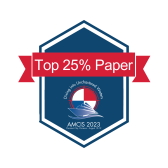Loading...
Paper Type
Complete
Description
Digital risk—or the likelihood of losses from organizational context, digital infrastructure, IS sourcing, data management and IS applications, is a key consideration in the valuation of firms. We apply a neural network approach to construct and measure digital risks by extracting linguistic relations from the 10-K disclosure (Section “Item 1A”). We develop novel firm-level digital risk measures based on these linguistic relations from three perspectives: (i) presence (whether the digital risk is mentioned or not), (ii) intensity (text coverage of digital risk relative to other issues), and (iii) diversity (the different types of digital risk that are mentioned). We validate our measures for digital risk by demonstrating that they correlate significantly with firm risk, as proxied by the volatility of the stock market. Overall, our findings suggest that the utility of leveraging this type of text-based measure for digital risk is practically feasible, scalable, and economically meaningful.
Paper Number
1440
Recommended Citation
Long, Yuan and Rai, Arun, "Decoding Digital Risk from Corporate Disclosure: A Neural Network Approach" (2023). AMCIS 2023 Proceedings. 8.
https://aisel.aisnet.org/amcis2023/sig_dite/sig_dite/8
Decoding Digital Risk from Corporate Disclosure: A Neural Network Approach
Digital risk—or the likelihood of losses from organizational context, digital infrastructure, IS sourcing, data management and IS applications, is a key consideration in the valuation of firms. We apply a neural network approach to construct and measure digital risks by extracting linguistic relations from the 10-K disclosure (Section “Item 1A”). We develop novel firm-level digital risk measures based on these linguistic relations from three perspectives: (i) presence (whether the digital risk is mentioned or not), (ii) intensity (text coverage of digital risk relative to other issues), and (iii) diversity (the different types of digital risk that are mentioned). We validate our measures for digital risk by demonstrating that they correlate significantly with firm risk, as proxied by the volatility of the stock market. Overall, our findings suggest that the utility of leveraging this type of text-based measure for digital risk is practically feasible, scalable, and economically meaningful.
When commenting on articles, please be friendly, welcoming, respectful and abide by the AIS eLibrary Discussion Thread Code of Conduct posted here.




Comments
SIG DITE